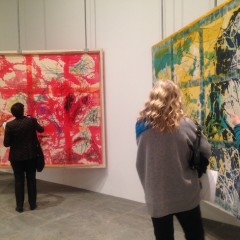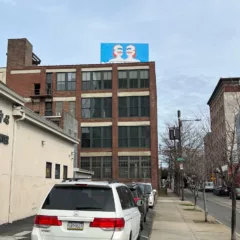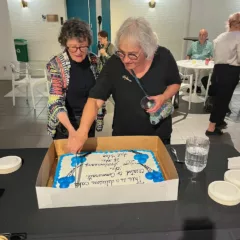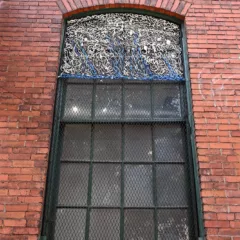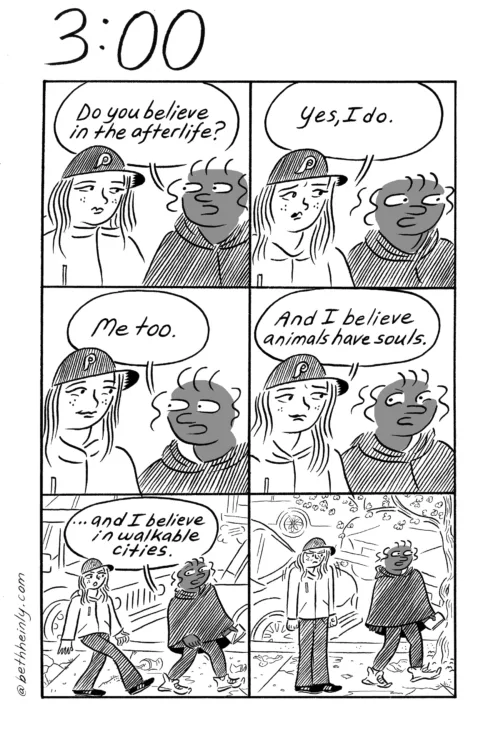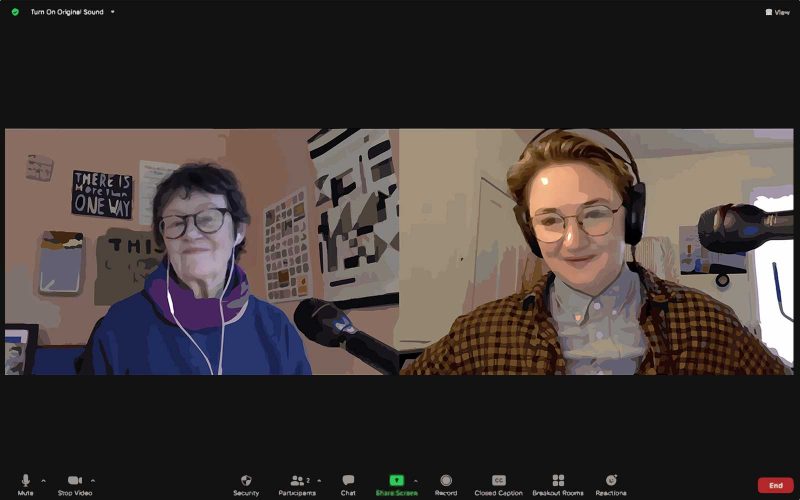
During Covid-19, Morgan and Roberta decided to record their conversational touch bases on Zoom. These atypical Artblog Radio episodes meander into various areas of art, culture, and life. In this episode, Morgan and Roberta review several Zoom talks they’ve attended, featuring artists Glenn Ligon and Hilton Als, Betty Leacraft, and a panel on African Diaspora dance organized by Artblog contributor Kemuel Benyehudah. Roberta also comments on the new David Wojnarowicz documentary, and Morgan recaps one of the million podcast episodes they listen to about a food critic who loses her sense of smell!
You can listen to Artblog Radio on Apple Podcasts and Spotify. Thank you to Kyle McKay for composing Artblog Radio’s original podcast intro and outro!
Links
- Watch ‘Artist Talk: Glenn Ligon and Hilton Als’ at the Princeton University Art Museum Facebook page.
- Watch ‘The Therapeutic Benefits of African Dance for College Students’ moderated by Kemuel Benyehudah at The Samuel DeWitt Proctor Institute’s Youtube.
- Listen to “Betty Leacraft talks of fibers, family, ancestors and Philadelphia Assembled” on Artblog Radio
- Read more information about the David Wojnarowicz documentary at Lightbox Film Center
Transcription
Morgan Nitz: Hey, Roberta, how you doing?
Roberta Fallon: I’m okay. How are you, Morgan?
Morgan Nitz: I’m good. It’s Wednesday, it’s the end of the month of March. I don’t have any April Fool’s jokes plans. Do you?
Roberta Fallon: No. I’ve never been really a punker, so I’ve never done that to anyone, but I did see a good one the other day. Maybe you saw it. It was about Volkswagen.
The Volkswagen U S announced that they’re coming all electric now, and they were going to change their branding in the U S too. Volts-wagen V-O-L-T-S.
Morgan Nitz: That’s pretty good.
Roberta Fallon: I bought it. I thought it was funny. And then by the end of the day, the mothership in Germany said no, that was a practical joke.
That was an April Fool’s joke.
Morgan Nitz: Oh my goodness.
Roberta Fallon: They’re not doing that, but I, I thought it was great actually.
Morgan Nitz: That’s pretty good. (laughs)
Roberta Fallon: Very funny. (laughs)
Morgan Nitz: So we’ve been attending a lot of virtual events lately and they’ve all been pretty phenomenal.
Roberta Fallon: Unbelievable. You know, and there’s millions out there. I guess if there is an upside to the pandemic, it’s that there’s been a lot of free podcasts and free zoom videos that have been wonderful, you know, with really smart, good people that otherwise you wouldn’t get to see and hear. It’s been just a good week, or a good month, I guess it’s spanned, spanned a while.
Morgan Nitz: Yeah. It feels like there’s this new energy in the air. Or maybe I just have more energy to, attend these virtual events because they’ve been happening left and right.
But feels like there’s been some really phenomenal ones that coincide with. The weather becoming really nice. And so I’ve been loving attending them.
Roberta Fallon: Yeah, well, I think there. I have heard that this zoom webinar and podcasting is going to stick around. If anything is going to stick from our habits that have changed during the pandemic, this will be it. Because a lot of people have found a lot of hope and satisfaction and joy from being able to see others and hear others, and hear these very good talks and, you know, listen in on conversations that they might not otherwise be able to listen to. And people are so lonely. You know, this is so hard to be in this isolation for so long. And zoom is relatively inexpensive. And a lot of these lectures, I think everything that I went to was free. Or YouTube, a lot of things are being now put up on YouTube.
Morgan Nitz: Yeah. It’s definitely more I mean, to a certain extent, people are, are sick of zoom. Right?
But I think they’re sick of zoom where they have to participate actively and be staring at the screen. But the nice thing about these lectures is whether you’re there in person or at home, you are a listener and you can check out, or turn off your video, and you can attend from home. So .
Roberta Fallon: Yeah, no, that’s right. You can participate. However, whatever the level is that you want to, and it’s good. Yeah.
Morgan Nitz: Yeah. And I think for me, at least it’s going to take me a little while to get back to the same energy levels that I had to go out and be doing things. You know, like socializing. (laughs)
Roberta Fallon: (laughs) I, you know, I can’t even go there yet. In my head, I’m still so isolated in my house, and on the walks I take in my neighborhood, I don’t go in the car anymore. You know, I get food delivered and it’s, I can’t make the mental leap yet to being out in the world.
Morgan Nitz: Yeah. Yeah, no me either. I can’t imagine like scooting around town from work to a poetry workshop to a friend’s house, you know, it’s just unthinkable.
Roberta Fallon: Yes! And, and for me, riding SEPTA is going to be a major hurdle. You know, I don’t want to drive the car and park, and I don’t want to ride SEPTA yet. I don’t believe in them yet. Sorry, SEPTA.
Morgan Nitz: No, I’m with you.
Roberta Fallon: Yeah.
Morgan Nitz: Or planes, or trains, or anything enclosed like that.
Roberta Fallon: Yeah, it’s going to be awhile. Filtration systems need to get really better, I think. And we need that herd immunity or whatever it is that we’re lusting after so that we can all be together again.
Morgan Nitz: Yeah. Well, let’s talk about some of our favorite events that we’ve attended. What was your favorite Roberta or which one do you want to talk about first? Cause it’s hard to choose favorites.
Roberta Fallon: Oh man. Yeah. I cannot choose favorites here. That’s not a good question. I’ll just go in chronological order. So the first one that knocked my socks off was Glenn Ligon speaking with Hilton Als at Princeton University. This was hosted by Princeton, I believe Hilton is a writer-in-residence, or was a writer-in-residence at Princeton University.
There were 2,376 listeners. I love this kind of detail.
Morgan Nitz: Wow.
Roberta Fallon: They always tell you who all, how, what the numbers are when they’re really big numbers. And Glenn Ligon makes phenomenal work with words. He does use other materials, but he uses words as his medium. He uses stenciling, and paint, coal dust apparently, and he uses texts that he sources from James Baldwin, and Richard Ellison… is that his first name? Richard Ellison? That sounds wrong.
Morgan Nitz: Ralph Ellison?
Roberta Fallon: Yes. Yes. Ralph Ellison. Thank you. (laughs)
Morgan Nitz: Yeah. I love the book Invisible Man. I’ve written many essays on it. Yeah.
Roberta Fallon: Oh, no kidding. I would like to see one of those. Send me your best essay.
Morgan Nitz: Oh man. I, well, one was from AP English in high school. I can’t imagine I grasped the book’s weight. You know?
Roberta Fallon: I don’t know, high school? Pretty smart in high school, I bet. And, his pieces are very wounded. You know, he builds up a surface and then scrapes it back and then builds it up again, and it’s all words that are disappearing, and appearing, and ghostly, and angry, and in your face, and bigger than you. Large works. And Hilton Als is a word crafter also, but of the written word. And, truly a remarkable writer, has been the theater critic at the New Yorker since I think 2008? But writes about, oh, just a whole manner of things, but it’s very social justice engaged.
They’re both African-American and they know each other. And this was a conversation of two people who really loved each other, liked each other as friends and knew each other pretty well. And they had gone over this territory before, but they were very generously doing it again for a public audience that was hungry to hear them speak.
And so, among other things, Hilton Als says, and he’s mostly the questioner? He says to Glenn Ligon, “I’m happy and greedy to ask you things I didn’t know, and be helpful for young people waiting for permission to make things.”
Isn’t that a great concept?
Morgan Nitz: Yes.
Roberta Fallon: I mean, that, that was how this thing started and it’s like, wow, this, this is amazing. This is not your use usual zoom. And then the background behind both of them was a wall of books. Just a wall of books that went up to the ceiling, as far as you could see, it was just phenomenal. Anyway,
Morgan Nitz: I love that. Because I think about being a young artist and not knowing exactly what you want to make? And that’s… or not knowing what it is that, it is possible to make, right?
And I think usually the second is more true. It’s not that you don’t have something to say, it’s you don’t know how to say it. And in a way that is a need for permission… by being exposed and having representation of your interests and your passions.
Roberta Fallon: Absolutely. Absolutely. And you know, if you’re an art school, even though, you know, it’s been said over and over again, “You got to break the rules.” Still, they’re telling you there are rules. And you are inculcating those rules and, you know, sort of embracing them! Even when you don’t want to.
Morgan Nitz: Yeah, exactly. And I mean, we were talking about someone recently and I can’t remember who, but they were talking about an application, and if you provide examples that people will inadvertently use those examples because they’re applying for funding, I believe it was.
And it’s also, if you provide a limited scope at all, you sort of- I think you naturally start to think, well, what is outside of that? And even that can be limiting because you’re still starting from that source material.
Roberta Fallon: The one other thing I wanted to say about this, it went on for a whole hour. They just, they could have gone on for another two hours, but, you know, they had to saw it off after a point.
And the other thing that I picked up that I really really loved was when Glenn Ligon was talking about his work and he said, “I was always drawn to abstraction. And I was at a very early age, drawn to art and felt that art was what I loved and it made me a good citizen.”
Morgan Nitz: Wow.
Roberta Fallon: And then he said on abstraction, “there was no room in white abstraction for me.” So I went to Baldwin. And then he find he found his source material in that. Isn’t that amazing? And if you think about his work, it’s pretty abstract. It’s, you know, if you stand far away from it, sometimes you can’t read it. It looks like an abstract painting until you get up close and you see that there are words and you have to struggle to find them.
Morgan Nitz: Well, Roberta, is there, do you know if there’s a recording of this anywhere that we could link to?
Roberta Fallon: I will find it if there is, and I will, we’ll put it in the text that goes around this podcast. I’m sorry, I don’t have it, but it’s Princeton University Department of Art, I’m guessing, or Museum, one or the other.
Morgan Nitz: I’d love to listen to it because these things are very powerful and in context, I bet it’s expanded upon. And I’d love to hear it.
Roberta Fallon: It was a great conversation. Everybody should listen to it if it’s recorded and I hope it was.
Morgan Nitz: Yeah. Great.
Roberta Fallon: So that’s my first, do you want to throw one out there?
Morgan Nitz: Well, the other two that we, we attended these ones together– I didn’t go to the Hilton Als and Glenn Ligon– but we went to “Art Break with Betty Leacraft at AAMP.” And we saw Kem, Artblog contributor Kemuel, who ran a panel at Rutgers about African Diaspora dance.
Roberta Fallon: Yeah, those were great. Those were both really worth going to, and I hope they’re recorded also and available somewhere. Should we get into Betty’s first? I have, I have some notes. Betty talked, Betty was a tech at the Fabric Workshop and Museum, from 1980 to 1986.
Betty is a Philadelphia artist, a textiles artist, does surface design, and sculptural installations, altars… beautiful stuff. Anyway, she talked about how her time at the Fabric Workshop was an artistic crossroads for her. She said before that, she was making garments. That was her art. She did a lot of fabric construction of garments and she got to work with other artists at the Fabric Workshop. And they introduced her to things like quilting.
She worked with Moe Brooker and with Betye Saar, and in both cases. She was working on quilts that they made. And so she learned about putting surface design on quilts and then quilting. And if I think about Betty now, one of my favorite pieces of hers is the Kensington quilt that she made? It was made as a result of the…
Morgan Nitz: Was it Philadelphia Assembled?
Roberta Fallon: Yes. It’s part of Philadelphia Assembled. Thank you, Morgan. And it has a Kensington in the title– and I can’t remember what the exact title of it is– but it’s photos, and maps of Kensington and it’s about the red lining and keeping out of African-Americans during the fifties and sixties and ever onward, from housing. From buying housing and living there. It’s a very moving piece.
And so the fact that she wasn’t originally in the quilting zone is endearing to me. It shows a lot of flexibility and growth. Which, you know, not everybody gets out of their… Off their treadmill and into a new zone? But Betty consistently, throughout this talk she gave, talked about new things that she was picking up, and loving it. And now she does digital embroidery, for example. Yeah.
Morgan Nitz: So, my favorite part of this talk was.. You know, apart from just hearing Betty speak after DM-ing with her on Instagram– she sends us like, things that we should know about and it’s awesome, and it’s just nice chatting with her– apart from just hearing more about her career, her very long and impressive career… it was a webinar, so you couldn’t exactly see who was in the crowd, but people were chatting. Um, she, she knows Karen Smith was in the chat and she said, “Well, Karen Smith has amazing vegan pies!” and it was just great.
But after that talk, I went back into the Artblog Radio archives, and I said, I bet that there is a podcast with Betty and I’m sure you’ve told me. But I, I can’t remember. There’s so many podcasts. And there was! And the reason I knew it was Philadelphia Assembled is because she was talking about that project. That project was in its early stages. When you spoke with Betty.
You know, She talked about making works that are scaled for the living space. She talked about showing in South Africa and fundraising and going to South Africa, to see it, to see the show, which is surrounding Nelson Mandela, and the bead work she saw there, the bead work she bought there.
And she got into all of this, these workshops that she was doing at the time. Some of which were done with young women who were incarcerated. Another one was at Taller Puertorriqueño, where she worked with students to talk about the topic of AIDS. And so she’s had this really long, just amazing career, that’s very people and community oriented. And she was also talking about how her family, has a long lineage of makers and how she credits them for becoming the the maker that she is today. So… deep dive on Betty recently.
Roberta Fallon: Yeah, no, it’s good.
And we love Betty and she’s absolutely worthy of every accolade she’s ever gotten. She’s gotten multiple Leeway grants and awards and grants and awards here and there. Absolutely so deserving of them. Yeah. The, the last thing I’ll say about Betty is that at her AAMP talk, she talked about collaboration and how it helped, she says “It helped me step out of my solitary person and work in a broader context. Where does my skill intersect with a filmmaker, or someone else?” So there, you know, the flexibility, the openness to working with others, just the total package.
Morgan Nitz: There’s just something so special about people who are always craving to expand what they know and to adjust their worldview, which is a tough thing to do.
Roberta Fallon: Yeah. And then share, you know, share with others with young people. Betty is I think, big on the ancestors and the young people and connecting, you know, the thread that flows through.
Morgan Nitz: Yeah. Yeah. And that’s really special, I mean, that’s a great reminder right now.
We’re in this pandemic and there’s a lot that’s an unknown about when it will end. There’s some hope with vaccines, but we really don’t know, and we need to just constantly be connecting in whatever ways we can each other.
Roberta Fallon: Absolutely true. So true.
Morgan Nitz: Well, Kem’s panel at Rutgers was really great. I mean, let’s talk about it briefly. Kem organized this panel. And it was called something along the lines of “The therapeutic effects (or benefits) of dance for the African Diaspora”. You know, they acknowledged that one of the panel conversationalists had issue with that name because she was saying that dance should be an, exercise and therapy should be preventative.
It should not be treating something after the fact and how important it is to have preventative measures such as dance, integrated into institutions, such as higher education, and…
Roberta Fallon: I love that. I just love that. This was Beverly Pittman. Who’s a kinesiologist and health worker and writer, researcher. And she gave a background about this and talked about how she said “They took music and physical education out of the school. And what was the response? Now we have music therapy, dance therapy, and art therapy.” It’s like turning it from, this is beneficial to, oh, you’re sick. You have to get this therapy, which I thought was so interesting.
Morgan Nitz: That really neatly fits in with q podcasts I recently listened to, but we’ll get into that later, but it was about smell therapy! For people who have extended smell loss from COVID. So I’ll tell you about that, but I’m glad you captured that quote. It’s very poignant.
Roberta Fallon: Yeah, I agree. No, it was really great. So Bravo to Kem for rounding this up. We had Vince Johnson in there, who was in the Rennie Harris, pure movement and Crystal Frazier, choreographer. Also former Rennie Harris. So, and then there was India Bernardino, who is a Great on Skates roller skater, a movement person, and Thomas DeFrance who is a dance person, Slippage Creative for Betterment out of North Carolina. So it was a powerful panel. And they all spoke really beautifully. It was great. And, and again, Rutgers probably has it recorded somewhere that you can listen to.
Morgan Nitz: I hope so. I really enjoyed it. And it’s also nice. A few of them, if not, all of them knew each other. And it’s, you know, you were talking about how Hilton and Glenn knew each other and it makes for a great conversation. Yeah.
Roberta Fallon: I agree. Totally.
Morgan Nitz: You get these glimpses of things that you wouldn’t normally be privy to if you, you know? Whether it’s eye contact or extra laughter that you wouldn’t normally get, they’re referencing things they’ve done together and it just makes it rich.
Roberta Fallon: I agree. Totally, totally. And you know, the back and forth between Kem and Beverly Pittman, she was the one that objected to the title of the panel, which had the word therapeutic in it. They just, they kind of went at it a little bit as they had over email and phone calls before that, because there was a back and forth about the word therapy and the whole concept of therapy.
Morgan Nitz: That was great. And Kem said that he left the title of the panel that way so that they could touch on the topic.
Roberta Fallon: It was great. It was great to be in kind of in the background hearing about that conversation that they have.
Morgan Nitz: Yeah, yeah. Yeah.
Roberta Fallon: So the one final thing that I want to just talk about that I saw, should I go ahead with that?
Morgan Nitz: Yeah. Tell me!
Roberta Fallon: Okay. It’s the David Wojnarowicz. A new documentary. I can’t even remember the name of it. I just saw it. It just came out and it’s a very, it’s very good.
Morgan Nitz: And you screened it from Lightbox Film Center.
Roberta Fallon: I screened it from Lightbox. Yes. Actually it was amazing because there, it was on our website. They. Thank you Lightbox. They took a little banner ad out and I clicked on it and it was not a lot of money to watch it. You get five days to watch it. It’s two hours and 48 minutes long. So you need five days to watch it.
I actually rewatched part of it and it’s, it’s very well done. And it’s based on David’s tape journals. This was back in the cassette tape era? He is, he dates from 1954 to 1992, I think he died, of AIDS. And it was an AIDS activist. Started out as a poet, had a very terrible childhood with an alcoholic father. That’s treated the family beat up the mother, beat up the children. David ran away a lot, spent a lot of his childhood on the streets in New York city.
But found himself through words and poetry and writing. And that was his first tool as an artist was the words. He was an amazing wordsmith and wrote and wrote, but he also tape-recorded things. And so he recorded these journals on tape and there’s now an archive of everything. And he saved all of his voice messages that were left on his old voice recording machines with the telephone.
So interspersed throughout the whole piece is David speaking, his words, and then the voice recordings on the telephone calls of the calls that he missed. And. It makes for a really, you are there, kind of loopy, in and out narrative, which I really appreciate it. It seemed to go with David’s Helter Skelter kind of life.
He lived a nonlinear life in many ways you know, back and forth and up and down. And but I guess there was a flow through that was consistently activist, and about AIDS. And, you know, he was a deeply troubled individual, but very brilliant. He was just a genius. And there was a, I saw his… I’m a fan I’ve read the biography that was done of him a few years back Cynthia Connolly? Cynthia, I’m sorry. Blanking on the name again. I didn’t do my research thoroughly enough (laughs) Sorry, people! And saw his retrospective at the Whitney museum, which Andrea Kirsh wrote about on Artblog. I didn’t write about that, but she did, very movingly and said it was a must-see show and it was absolutely stunning.
Morgan Nitz: Hm!
Roberta Fallon: The amount of work that he produced, even up to the end, and the quality of it. Just knock your socks off.
Morgan Nitz: Another thing to my watch list. I, I, yeah, I’m not familiar and I’d love to listen. I think, especially what you’re describing the movie is, is tough to do where you’re getting these little glimpses at different parts of people’s lives, but. If it’s done effectively, it can be very moving.
Roberta Fallon: Yeah. It’s definitely a montage and it’s kind of Skelter Helter Skelter-y. But it does add up, it adds up to a really moving portrait of the era as well as this person. Yeah. Highly recommend it.
Morgan Nitz: It sounds great.
Roberta Fallon: All right. So what have you been listening to, or what are we going to talk about now, Morgan?
Morgan Nitz: Well, you know, me, I, before the pandemic, I listened to music when I worked and I listened to podcasts when I walked, sometimes… but something has switched in me and all I’ve done, I think since March, I’m serious, is listen to podcasts. And when I’m not listening to podcast, I’m either watching something or reading or whatever else. I feel that even if I’m painting, I’m watching something or listening to something, I just can’t get enough of narrative right now. I think it’s just, I need that distraction.
Roberta Fallon: Oh, yeah. I know what you mean. Narrative is really important!
Morgan Nitz: Yeah.
Roberta Fallon: Just disappear into that narrative and forget about your isolation here.
Morgan Nitz: Yeah. And I think also, you know, I’m from a big family and I, I have always needed kind of…. noise. So now that we’re so lonely, it’s voice, it’s other people talking and it’s nice.
Roberta Fallon: That’s so interesting. You, you have your family with you in your ear the whole time, and it’s a bigger family than you ever thought you would have.
Morgan Nitz: Yeah, so, okay. I go through my phases. I sort of find podcasts I like, and I listened to a lot of them and sometimes it’s not possible because it’s a news one. And you don’t want to listen to the news from last year, but the one that I’ve been listening to recently, this is my little morning routine. When I wake up, I listened to the New York Times’s “The Daily”.
Roberta Fallon: Okay. I know of it. I don’t listen to it.
Morgan Nitz: Okay. Well, it’s very good. It will. I wasn’t sure I would like it when I first listened to, because the host has this very distinct NPR ish voice, and he goes, “I’m… Michael Barbaro. See you… tomorrow.” And he just… “Here’s…. What else you need to know today.” but I ended up loving it! So.
So one of the best podcasts from the daily that I’ve recently listened to, it was called “A Food Critic Loses Her Sense of Smell.” So the New York times food critic, her name is Tejal Rao. She has a very mild case of COVID. She describes it as she wakes up one morning and she thinks she smells stagnant water, and she… is wondering if maybe someone in her household cleaned recently? Like she couldn’t identify the smell. Obviously smell is very important to her career. And so she came to notice that what she was really smelling was an absence of smell.
And so she. She panics a little bit. She gets a COVID test, she, in fact has COVID and she ends up experiencing a form of long COVID, they call it? Where I, I believe you’re not contagious, but you it’s caused by an inflammation of the brain from your, from your body, trying to respond to the virus.
So the most common one, I think people experience is extended loss of smell, but. You can also experience things like intense paranoia for extended periods of time.
Roberta Fallon: Wow.
Morgan Nitz: Yeah. Was that was all information from another daily podcast, but so she’s trying these home remedies, she finds one on TikTok from this guy Kemar and it’s a Jamaican remedy that he learns from his mom where you’re supposed to burn an orange all the way around until it’s blackened.
And then you peel it and you mash it and you put sugar in and you eat it hot. And it doesn’t work, but she does, she talks on the phone with this TikToker and then he, she talks to his mom, which is really endearing. They’re just very generous people. And what she, what she holds onto is that the mom says “You need something to reboost your brain.” so it turns out, you know, in this family, that’s probably a very familiar taste for them. So it kind of. You know, resonates mentally as well.
She latches on to what the mother said, and then she ends up speaking to a Philadelphia doctor named Dr. Pamela Dalton, and she is a basic research scientist at the Monell Chemical Senses Center. And Dr. Pamela Dalton actually lost her smell, not from COVID, but a different viral infection. And that led her on a path, to figure out what was going on. And it’s very interesting. Something that they said that really stuck out to me was that people who experienced smell loss, it takes them longer to smell? The smell is delayed essentially.
They described the way that you smell as a map in your brain. And if you regain your smell quick enough, your brain still has the map on file. But the longer that time goes by, you have to sort of rewrite that map. So you’re making new, mental, and memory connection at an emotional connections to things.
Something that this doctor suggested that she do is take herbs and spices that are familiar to her? And put them out in front of her, like four of them. And instead of taking these big whiffs like, (inhales deeply) You know? And then getting frustrated, she told her to clear her mind entirely, and don’t think about what you should be smelling and took these little bunny snips, like, (takes four quick, shallow breaths) and then you wait.
And eventually she said she had this rushing uh memory of her grandfather chewing on cardamom seeds. So the, the emotional and cognitive memory came back of the smell, even though the smell was faint. And that’s one of the ways that you can start to get your smell back.
Roberta Fallon: Wow. Yeah. I want to say that you illustrated that with your (sniffles) and whatnot very well, Morgan. You could be a sound actor or whatever they call that. It was great.
Morgan Nitz: Oh, well, thank you. I’ve listened to so many podcasts.
Roberta Fallon: That’s an amazing story and I’m glad to have that tip everybody. That’s a great tip. If you lose your smell, put your spices out there and just take bunny sniffs. I liked that you characterized it as bunny sniffs, and then wait for the memory, the mental picture.
Morgan Nitz: Yeah. She said it felt a lot more like real therapy, you know, and this relates back to what you were talking about with dance. The doctor was reluctant to call it recovery because it’s not an illness. So you recover from an illness. But it’s an injury that you have to heal from.
Roberta Fallon: Okay, so healing and not recovering.
Morgan Nitz: Yeah. Cause I guess it’s an an injury is losing your sense of smell is an injury.
Roberta Fallon: Yes. How very cool. Well, there you go, everybody.
Morgan Nitz: There you go. I think our time is almost up, but I wanted to say, we have a few closing notes. Something I wanted to do was shout out this podcasting company that I work for in my spare time.
Roberta Fallon: You have spare time, Morgan? Tell me about this spare time! I thought you work for us 80 hours a week. No?
Morgan Nitz: Yeah, no. I mean, I’ve been filling my spare time. Just try to keep busy, but something I do to fill my spare time is I edit this, this podcast and that the company is called “Textured Heir” and it’s founded by a woman named Mariah Woods who went to Temple University. And she lives in California now, and it’s all about, celebrating black women. and black culture, The one is, “Does it hold up?” And they look at film TV shows and albums, and they have invaluable discussions about whether or not. These things hold up and in the current day and the other one is “Where my girls at?” And that one is all about black women in hip hop.
And they’re doing really amazing work. I mean, Mariah not only founded textured heir, but co-hosts both podcasts and edits the one that I don’t edit and puts up content constantly on YouTube. And I just think they’re doing really great things and I’m very impressed by them. My high school friend, Camille, who was very into musical theater, is currently very talented singer and actress, cohosts does it hold up? So she’s from Philly and just wanted to shout them out.
Roberta Fallon: That’s very nice. Very nice. I like that. And can you find these on every podcast channel everywhere?
Morgan Nitz: Yeah, I think so. Definitely a Spotify. That’s the, the, the platform I use, but I think they say wherever you get your podcasts, so cool. Yeah. And tomorrow, I don’t know that this podcast will be out by then. We’ll fi we’ll find out, but tomorrow we’re going to be at venture cafe’s virtual first, Thursday. Again, we’ve been going for the past couple months. It runs from six 30 to eight on a platform called Remo. And what do we do there, Roberta? We just, we hang out?
Roberta Fallon: Yeah, we hang out with it’s a. It’s like going to first Friday going gallery hopping on first Friday, there are a bunch of different tables there with galleries represented at the tables and Artblog has a table and you just hop around and you say, hi, what’s going on?
And we get into these amazing conversations with people about collecting art and the price of art in Philadelphia versus New York. And, you know, it’s really worthy conversation. So we’d love to see you there.
Morgan Nitz: Yeah. Yeah. We’ve had some lively conversations and even debates and it’s just been great.
Roberta Fallon: Yeah. No arguments though. Just debates.
Morgan Nitz: Yeah. Yeah, of course. Well, I think that’s our time. This has been Artblog radio. It’s been great chatting with you, Roberta
Roberta Fallon: Always, Morgan. Great chatting with you and we’ll see you again on zoom. Real soon. I’m sure.
Morgan Nitz: Yes. I’m. Sure. All right.
Roberta Fallon: Bye bye.



